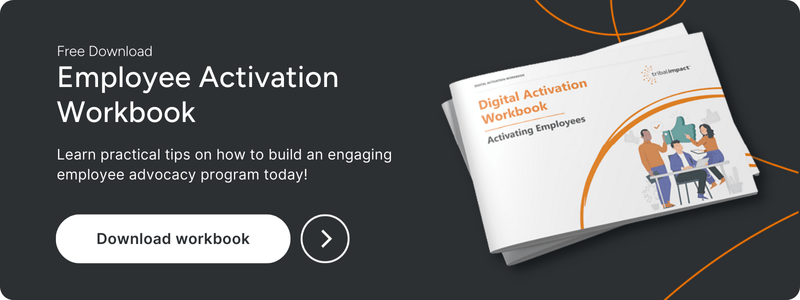Referral marketing is, to put it simply, word of mouth. It's getting employees or current connections to refer or introduce others to you in their existing networks.
Implementing referral marketing strategies into your business is a powerful way to grow your brand and increase revenue. It leverages the power of social selling and employee advocacy to tap into existing networks and reach new audiences.
Referral marketing is one of the most cost-effective and valuable marketing tools at your fingertips. And here's why:
- 92% of buyers trust recommendations and suggestions from friends and family more than advertising. (Source: Nielsen)
- 84% of people from 58 countries say that they trust recommendations from friends and family. (Source: Nielsen)
- 60% of marketers say that referral programs generate a high volume of leads. (Source: Forbes)
In this blog, we will share how referral marketing can grow your business, the dos and don'ts of a successful referral strategy, and how you can leverage social media to earn referrals.
The 7 Ways Referral Marketing Can Grow Your Business
So let's begin with how referral marketing can grow your business. Whether you're product or service based, asking for referrals and implementing referral marketing strategies is one of the best ways to tap into your existing network.
The best referral marketing strategies will:
- Expand Your Reach: Referral marketing can help you reach potential customers you may not have been able to connect with otherwise. In addition, you can reach a much wider audience by empowering your employees to utilise their social networks.
- Build Trust: Word-of-mouth referrals are some of the most effective types of marketing because they come from people we trust. When a friend or family member recommends a business, we're much more likely to trust their opinion than if we saw an online ad for the same company.
- Increase Sales: Referral marketing can help you close more sales. According to ReferaralRock, 74% of customers say referrals have influenced purchase decisions.
- Lower Customer Acquisition Costs: Referral marketing can be a cost-effective way to acquire new customers. You’ll spend less on word of mouth than traditional marketing channels.
- Boost Loyalty: If you reward referrals, you're incentivising them to bring in new business and showing them that you value their loyalty.
- Collect Valuable Feedback: Referral marketing can also be a valuable source of feedback for your business. Referrals can give you insight into what your referrer likes about your business and what you can improve.
- Measure Results: Referral marketing is easy to track and measure. Using tools such as LinkedIn and Sales Navigator lets you see where leads and sales are coming from. This can help you fine-tune your strategy and optimise your program for maximum results.
Now that you know the benefits of referral marketing, it's important to understand how to successfully ask for referrals for your business.
Getting referral marketing wrong can alienate your network, damage relationships, and ultimately hurt your business instead of helping it.
The Dos And Don'ts Of A Successful Referral Strategy
Creating a successful referral strategy can be a powerful way to grow your business, but it's essential to approach it with the right mindset and tactics. Here are some dos and don'ts to keep in mind.
Dos:
- Use templates (that work): Creating a template for your referral request can help ensure you're asking for the right information, making the process more effective. Use well-crafted email templates and social media messages tailored to your audience.
- Build value & visibility first...then ask: Building a solid relationship with your network is vital before requesting a referral. Provide them with value, engage them on social media, and create content that resonates with them. When you've built a solid relationship, they'll be more likely to refer their friends and colleagues.
- Make it easy for them: When you ask for a referral, ensure it's easy for your customers to follow through. Provide them with clear instructions, a template, or even a pre-populated email they can send with just a few clicks.
- Be specific with your ask: When asking for a referral, be clear about what you want. For example, instead of a vague request for "anyone who might be interested," ask for referrals to specific types of customers who are a good fit for your business. This will increase the likelihood of receiving high-quality referrals that are more likely to convert into customers.
- Focus on your strongest relationships: Not all are created equal regarding referrals. Focus on your strongest relationships and those most likely to refer others.
Don'ts:
- Expect immediate results: Referral marketing takes time and effort to build. Don't expect immediate results or get discouraged if you don't see a flood of referrals immediately. It takes time to build a strong referral network.
- Treat referrals like cold calls: Treat referrals with care and respect. Don't approach them like a cold call or sales pitch. Focus on building relationships and providing value to the customer.
- Ask too many favours: While asking for referrals is important, don't overdo it. Asking for too many favours can strain your relationship with your connections and make them less likely to refer others.
- Connect on LinkedIn and then ask: Don't connect with someone on LinkedIn, and immediately ask for a referral. This can be spammy and may damage your relationship with the person.
- Approach people you don't know well: Referral marketing works best when you have a strong relationship with the referrer. Don't approach people you don't know well or who may not be a good fit for your business. Instead, focus on building relationships with your existing connections and tapping into their networks.
If you follow these dos and don'ts, you can create a referral strategy that is effective, respectful and builds strong relationships. This will be rewarded with stronger connections, shorter sales journeys and increased sales.
Leveraging Employee Advocacy And Referral Marketing
Employee advocacy is a powerful tool for referral marketing. By leveraging your employees' social networks and building a culture of advocacy, you can tap into a vast pool of potential customers and increase your brand's visibility.When you understand the importance of employee activation, you can harness the power of your employees' networks. By creating a culture of advocacy, you can turn your employees into your biggest brand ambassadors.
Want to take your referral marketing to the next level? Find out more about our Employee Activation Program.



